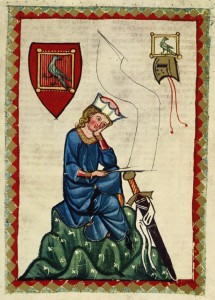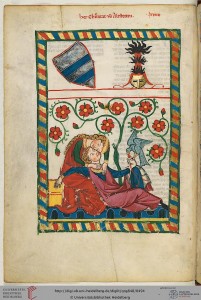![]() EN
EN
Since German Literature was my major in college, I thought it would be appropriate to include some short excerpts of my favorite German poems, with English translations. I finished college a long time ago, but I lived in Germany for one year, and I have close family ties to Germany. I have gone back to visit now and then.
The translations should give you some idea of what the original poems are about. At the end I have some German-related web links.
The following poem is from the Middle Ages, and is originally written in Middle High German:
DIE GROßE HEIDELBERGER LIEDERHANDSCHRIFT (Auszug) (14es Jahrhundert), von Walther von der Vogelweide.
Ich saz ûf eime steine,
und dahte bein mit beine;
dar ûf satzt ich den ellenbogen;
ich hete in mîne hant gesmogen
mîn kinne und ein mîn wange.
Dô dâhte ich mir vil ange,
wie man zer werlte solte leben:
Deheinen rât kond ich gegeben,
wie man driu dinc erwurbe,
der keinez niht verdurbe.
Diu zwei sind êre und varnde guot,
daz dicke ein ander schaden tuot,
daz dritte ist gotes hulde,
der zweier übergulde.
Die wolte ich gerne in einen schrîn.
Jâ leider des enmac niht sîn,
daz guot und weltlich êre
und gotes hulde mêre
zesamen in ein herze komen.
(Kelling, Hans-Wilhelm. Deutsche Kulturgeschichte: Preliminary Edition . New York: The McGraw-Hill Companies, Inc., 1996, page 66-67.)
English translation: THE GREAT HEIDELBERG SONG COLLECTION (excerpt) (Handwritten , 14th Century), by Walther von der Vogelweide.
I sat upon a stone,
And crossed leg over leg:
On top I placed my elbow;
I had nestled into my hand
My chin and a cheek.
There I pondered with great worry
How one should live in the world.
No advice was I able to give,
How one would acquire three things,
Of which none would go to ruin.
The two are honor and worldly possessions,
Which are not compatible with each other;
The third is the grace of God,
Which surpasses both.
I would love to have them together in one shrine.
But it unfortunately cannot be,
That possessions and worldly honor
And the grace of God ever
Come together in one heart.
(Kelling, Hans-Wilhelm. New York: The McGraw-Hill Companies, Inc., pages 66-67.)
This poem is a very famous landmark in German literature. The first section conveys the image of somebody sitting in the classical thinker’s position of contemplation, pondering how to live. The second half of the poem shows the thinker’s conclusions: There were three things which were important in the German society of that time: Honor, material possessions, and God’s Grace. He concluded that God’s Grace was most important, but that you could not have all three at once. This piece is famous because it is one of the earliest examples of political thought in the Germany of the Middle Ages, and because it reflects the thought of the time. The philosophical contemplation is one that for some people is still valid to this day. This piece is most unusual for that time period, because poems of this time were usually idealistic, extolling the virtues of Love, Honor, and Loyalty.
My interests in German literature are varied, but I will admit that they tend towards the obscure! I am especially interested in old, obscure, dead dialects of Germanic languages. The following example is interesting perhaps only for its obscurity. This language is called Gothic (spoken by the Germanic Goth tribes, and was an East Germanic language. The missionary Wulfilas invented a written language for the Goths when he converted them to Christianity. Unfortunately, the Bible is the only surviving written material in this language. Here is a sample (Matthew 5, 17-19):
17 Ni hugjaiþ ei qemjau gatairan witoþ aiþþau
praufetuns; ni qam gatairan, ak usfulljan. 18 amen auk qiþa izwis:
und þatei usleiþiþ himins jah airþa, jota, ains
aiþþau ains striks ni usleiþiþ af witoda, unte
allata wairþiþ. 19 iþ saei nu gatairiþ aina
anabusne þizo minnistono, jah laisjai swa mans, minnista haitada in
þiudangardjai himine; iþ saei taujiþ jah laisjai swa,
sah mikils haitada in þiudangardjai himine.
(Braune, Wilhelm. Gotische Grammatik Mit Lesestücken und Wörterverzeichnis. Neu Bearbeitet von Ernst A. Ebbinghaus. Tübingen, Germany: Max Niemeyer Verlag, 1981, page 144.)
This example is included just to display a bit of this obscure language. If you really want to see what it means, check Matthew 5, 17-19 of your favorite version of the Bible.
I also am very interested in various types of print and script. In German, they used to use a special type of print called Fraktur, which is a gothic form of print. At the same time, they used a style of handwriting to accompany it. I find this form very elegant, although it can be extremely difficult to read. Here I have included a key to both the Fraktur alphabet and the equivalent in handwriting, which should give you some idea of how it works.
In addition to German literature, I take a great interest in German dialects, because they vary significantly. A speaker of one dialect of German often cannot understand another, although almost all of them understand Hochdeutsch, which is the standard German taught in the schools. My favorite dialect is Plattdeutsch (Low German), which is spoken in the northwestern part of Germany, because a large part of my German relatives (from my mother’s side) originally spoke this dialect, and it is the indigenous dialect of Bremen, which is the city I lived and studied in for one year. Unfortunately, Plattdeutsch is dying out. It is like a dialect of Dutch with more German-style pronunciation. What can I say…it is very close to my heart.
Plattdeutsch-related links:
- Low German (Plattdeutsch) news service. Current news in Plattdeutsch!
- Plattdeutsch Comedy! A German TV comedy short that shows someone robbing a bank. He cannot understand Plattdeutsch, and it costs him…you can hear both Plattdeutsch and Hochdeutsch (Standard German) here for comparison. Very German humor.
- Hör mal n beten to (“Listen a little bit”)—a Plattdeutsch podcast.
General German-Related Links:
- www.germanculture.com.ua, a source of information on German culture and language.
- www.german-way.com., for all sorts of information about Germany, as well as online chat and discussion groups.
- www.focus.msn.de/F/FS/FSN/fsn.htm, for the online “Focus” news magazine (in German).
- german.about.com/od/radioingerman, for links to various German radio stations.
- www.wdr.de, for Westdeutscher Rundfunk (West German Radio, in German)
- www.dw-world.de, for Deutsche Welle, the international German news service.
- www.ard.de, for TV news in German.
- www.radiobremen.de has local radio news from Bremen and Northern Germany.
- german.about.com has good information about the German language.





Everything is very open with a clear description of the challenges.
It was really informative. Your site is very useful. Many thanks for sharing!
Thank you for your feedback!